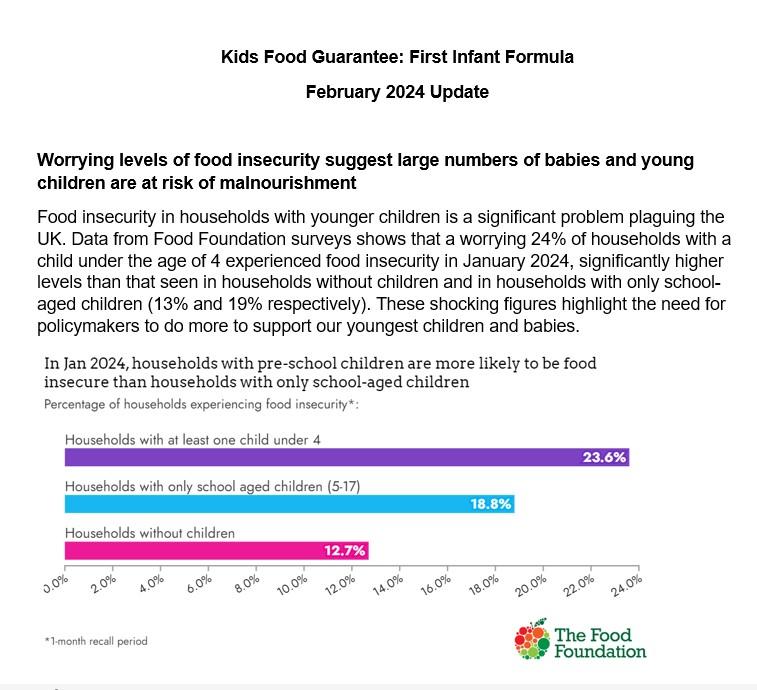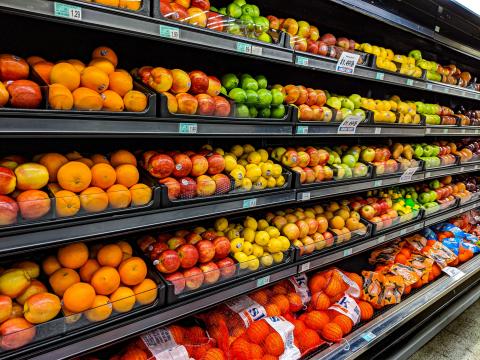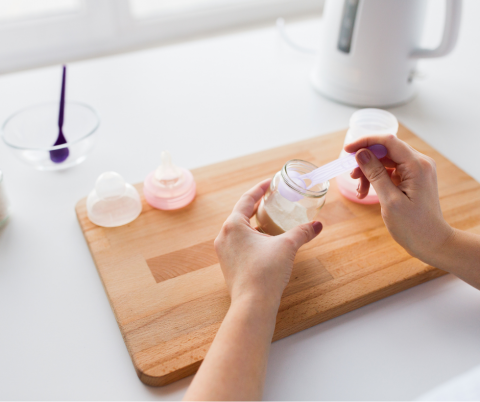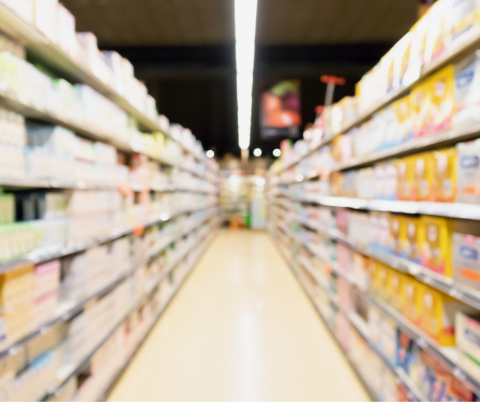
Kids Food Guarantee: First Infant Formula February 2024 update
Kids Food Guarantee: First Infant Formula February 2024 Update
Worrying levels of food insecurity suggest large numbers of babies and young children are at risk of malnourishment
Food insecurity in households with younger children is a significant problem plaguing the UK.
Data from Food Foundation surveys shows that a worrying 24% of households with a child under the age of four experienced food insecurity in January 2024, significantly higher levels than that seen in households without children and in households with only school-aged children (13% and 19% respectively).
These shocking figures highlight the need for policymakers to do more to support our youngest children and babies.
Formula fed babies are particularly vulnerable
Of particular concern are babies who are dependent on first infant formula, whether exclusively or partially. Targeting greater support to these families is needed for two important reasons: firstly, the substantially heightened risk of harm to babies from food insecurity and secondly, the unprecedent surge in formula prices which has outstripped the escalation of prices of other food categories.
Many families are reliant on first infant formula to feed their babies for a range of reasons, and where this is the case, safe and affordable first infant formula is absolutely essential.
The widespread media stories of families struggling to afford enough formula to feed their babies adequately is not only deeply disconcerting but also unacceptable in a wealthy country like the UK.
Data provided by YouGov in January 2024 shows that, in a Food Foundation commissioned survey of 500 mothers with children under 18 months, 1 in 4 (26%) said they struggled to afford formula.
To help feed their child, mothers surveyed reported behaviours such as shopping around for the cheapest options (23%), switching brands (12%), borrowing money (10%), weaning earlier than the recommended age of six months (10%) and skipping meals for themselves (10%).
This chimes with evidence showing that when faced with financial difficulties, stretching available household budgets to cover the cost of formula can lead to parents being forced into unsafe feeding practices, such as watering down formula, increasing the time between feeds, and substituting formula with other milks which are not appropriate for the age of infant.
These strategies are all part of efforts to make an inadequate quantity of formula stretch further but may result in babies receiving insufficient calories and nutrition to properly grow and develop.
In these circumstances, babies are at a high risk of undernutrition, due to their high energy needs during this rapid phase of development.
Additionally, younger infants lack the stores to withstand periods of energy and nutrient deprivation in the same way that adults and older children can.
In an attempt to mitigate levels of infant food insecurity baby banks have been springing up with a reported 250 now spread across the country.
However, reports are that they are unable to meet the worrying level of need. Nobody should be subjected this level of uncertainty and instability regarding feeding their baby.
It is therefore imperative that manufacturers and retailers act to insulate first infant formula prices from the worst effects of inflation.
Worth highlighting is the fact formula has been subject to higher rates of inflation than most other food categories.
First Steps Nutrition reported that between March 2021 and April 2023, the cost of seven standard powdered first infant formulas sold by market leaders increased by an average of 24%.
Furthermore, they found that the cheapest first infant formula on the market - the only own-brand infant formula available (ALDI’s Mamia brand) - increased by 45%.
Kids Food Guarantee research shows positive steps forward on first infant formula prices
As part of the Kid’s Food Guarantee, The Food Foundation has been calling on manufacturers and retailers to ensure first infant formula is affordable and tracking prices to monitor performance.
Our latest evaluation at the start of February 2024 (see appendix for methodology), has found that the price of standard first infant formula sold in 800-900g tins ranges from £8.99 to £14.00.
There have been a number of positive changes since we first started tracking price information in June, including:
- The price of Aptamil has come down across all 8 retailers stocking the brand since January, although there is still a large variation in price between retailers, ranging from £11.20 at Iceland (where prices have dropped the most since June) to £14.00 at the Co-operative Group
- The price of Aldi’s Mamia product, the only own-label brand on the market, has fallen by 40p. This is encouraging to see given that this brand saw the highest proportional increase in price between 2021 and 2023 (45%)
- Sainsbury’s, Co-op, Waitrose, and Iceland have all made progress in lowering the cost of the first infant formula brands they stock
- The biggest price reductions have been seen at Iceland, who committed to cutting the cost of all formula to cost price in August
- Aldi now offer a Cow & Gate product priced at £8.49, the only product on the market that now falls within the Healthy Start payment of £8.50 a week for families with children aged under one. However, it is important to note that this is for a 700g tin of formula, notably smaller than the size of other comparable products (800-900g).
Moreover, although progress is being made, prices increased at both ASDA and Waitrose for two brands of formula between June 2023 and February 2024.
The graph below highlights where prices have fallen since June (green) and increased (orange).
The reasons for these changes since our last data collection in November are clear. Manufacturers of formula have come under fire in recent months following the publication of the findings of an inquiry conducted by the Competition Markets Authority (CMA).
The inquiry found that manufacturers have been elevating the price of formula by a greater amount than was necessary to cover inflated input costs, and therefore have maintained high profit margins while parents across the country have been struggling to afford this essential for their babies.
Profits on formula were the greatest of any category investigated by the CMA.
Positively, Danone (one of the largest manufacturers of formula in the UK) has responded to the criticism, committing to cut the price of their Aptamil brand of formula by 7%.
Iceland must also be commended for their pivotal role in immediately announcing that they would be passing Danone’s price reduction on to their customers, leading to a domino effect of other retailers following suit. This can be clearly seen in the following graph:
While a most welcome step in the right direction, better yet would be to see Danone taking further steps to extend this price reduction to their Cow & Gate brand of formula as well.
Nestle, Kendamil and Hipp Organic, who have the remaining share of the UK formula market, should follow Danone in acting to reduce the price of their first infant formula brands.
The CMA are currently conducting a more in-depth investigation into formula prices following the findings of their initial enquiry and recommendations on actions to be taken are expected later in 2024.
Strengthening the Healthy Start Scheme to mitigate the risk to babies
While the CMA inquiry is a positive step in the right direction, more urgent action is needed to protect babies from undernourishment while we await their recommendations on formula pricing.
In the interim, urgent action is needed to support families struggling to feed their babies, and the Healthy Start Scheme is the perfect vehicle to deliver this.
The Healthy Start scheme is an essential lifeline for many low income families to afford first infant formula to feed their babies.
However, these cash payments are set at £8.50 per week (the equivalent of two payments) for children under one year of age, and unlike other benefits, the value hasn’t increased since 2021 despite high levels of inflation.
Our findings on first infant formula prices, which show high levels of inflation since 2021, show that the current value of the scheme is insufficient.
We are therefore calling on the Government to increase the value of the payments for babies under six months to £12.75 (the equivalent of three Healthy Start payments) as a temporary measure while the CMA complete their inquiry and their future recommendations can be implemented to ensure formula pricing is properly controlled.
For children of this age, who are not formula fed, this increase in payment would also support breastfeeding mothers who have increased energy needs to access a healthy diet during the cost of living crisis.
This is in addition to our other recommendations to retailers and government to tackle infant food insecurity (click here for further information):
Recommendations for retailers:
- Introduce own-brand first infant formulas and/or insulate prices on first infant formula from the worst of food price inflation, in line with our Kids Food Guarantee asks.
- Continue to promote the Healthy Start scheme to low income customers to ensure families are able to access sufficient, nutritious foods. This could include:
- Labelling - include Healthy Start information and QR codes on those products that are within scope of the scheme (fruit and veg, pulses, cow's milk)
- Use of loyalty programmes - targeted email communication to low income customers promoting the scheme. An additional option for those with the functionality would be to offer coupons or money off vouchers for Healthy Start products (excluding first infant formula)
- Targeted in store and online communication - promote the scheme to customers of stores in areas with low levels of uptake/high numbers of eligible families
Recommendations for the Government
- Increase the value of the Healthy Start allowance in line with inflation and price increases
- Expand eligibility of Healthy Start to more families in need
- Introduce pricing policies that ensure formula is affordable for those that need it
- Increase uptake of Healthy Start, to ensure no eligible families miss out
- Improved communication and information about the nutritional comparability of first infant formula to parents
Appendix: Methodology
Food Insecurity Survey
The survey was commissioned by the Food Foundation and conducted through YouGov. Total sample size was 6000 UK adults. Fieldwork was undertaken between 9th –16th January 2024. The survey was carried out online. The figures have been weighted and are representative of all UK adults 18+. The figures presented from the online survey have been analysed independently by The Food Foundation and the London School of Hygiene & Tropical Medicine.
We ask the following questions to explore how many households have experienced food insecurity:
- Having smaller meals than usual or skipping meals due to being unable to afford or get access to food
- Being hungry but not eating due to being unable to afford or get access to food
- Not eating for a whole day due to being unable to afford or get access to food
If they answered yes to any of these three questions, they are classified as food insecure. We ask them if they had experienced this in a) the last month and b) the last six months. The questions are based on the United States Department of Agriculture's Food Security Survey module.
Infant feeding You Gov survey
The Food Foundation commissioned You Gov Survey to undertake a survey of mothers with children under 18 months to better understand their experiences of feeding their infant, in particular focused on the barriers to breastfeeding.
The total sample size was 506 mothers of children age 18 months or less. Fieldwork was undertaken between 11th - 19th January 2024. The survey was carried out online. The figures have been weighted by age and region of live births in the UK.
Respondents were asked questions around breastfeeding intention, barriers to their own breastfeeding intentions, and factors they felt would have enabled them to breastfeed for longer. Questions were asked about exclusive breastfeeding, as well as any breastfeeding. In addition, questions were asked around the affordability of formula and harmful practices used when formula was unaffordable.
Kids Food Guarantee
To evaluate formula prices, we selected six standard first infant formula milk products sold in the UK and then found the price of these brands as listed online at each of the nine major UK retailers: ALDI, Asda, Co-op, Iceland, Morrisons, Ocado, Sainsbury’s, Tesco, and Waitrose. For families looking for the best offers available, in-store prices can be lower than the price of equivalent products online, but in order to compare like for like we have used online prices.
Data is collected at the start of every month. We compared the price in February to the prices of the same products in June when we first started monitoring the price of first infant formula. We looked at the price of formula sold in larger tins (typically containing 800-900g of formula) rather than in smaller portion sizes, or per 100ml, as this provides a more realistic reflection of typical shopping behaviour. For further details on our methodology please see our technical report and our last formula update.
- To find more data on formula prices visit our Kids Food Guarantee dashboard.





